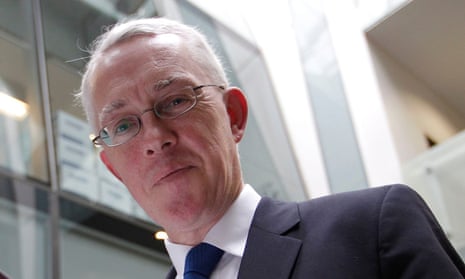Britain’s banks are vulnerable to a global financial shock despite efforts to shore up their finances, according to the official who led the inquiry into the safety of UK banks following the 2008 crash.
Sir John Vickers, who led the Independent Commission on Banking, said: “The Bank of England proposal is less strong than what the ICB recommended.”
Vickers, a former Bank of England chief economist, said Threadneedle Street had watered down the proposals put forward by the ICB, leaving it without the necessary financial buffers to continue operating when avenues to fresh funds dried up.
The warning came as China’s financial authorities were poised to spend billions of pounds propping up the Shanghai stock market after a week in which fears of a 2008-style banking crash resurfaced.
The Shanghai exchange, which will reopen on Monday following a long shutdown for Chinese New Year, will come under pressure from nervous traders amid concerns that a steep fall in stock market values this year is a harbinger of a broader global economic slump.
Investors fear that low inflation and the waning power of central banks to generate growth could push the eurozone back into recession and damage several of Europe’s biggest banks.
In what appeared to be a coordinated move ahead of the Chinese market’s reopening, the chief of China’s central bank, Zhou Xiaochuan, played down concerns over the state of the country’s finances, which he said remained robust and plentiful enough to withstand economic shocks.
A senior official at the European Central Bank also issued a statement reassuring investors that Greek banks were secure from the turmoil following their rescue by the ECB last summer.
Political unrest in Greece and the possibility of a re-run of last year’s eurozone crisis, when Athens was almost pushed out of the euro, have played a role in destabilising stock and bond markets.
Falling oil prices and persistently low inflation have also signalled that the global recovery is petering out. Central banks have responded by cutting interest rates to spur bank lending and growth. Some, including the Swedish and Japanese central banks, have brought in negative interest rates, in effect charging commercial banks to deposit money with them in a desperate attempt to make them lend it to businesses and households.
Vickers, who is now the warden of All Souls College, Oxford, told the BBC that more capital is needed, because the nature and scale of the next financial shock is uncertain.
“A good way to think about it is as an insurance policy,” he said. “You do have to pay a premium to insure your house and you hope nothing bad will happen. But if it does, you are much better off in paying that premium, and for full coverage.
“If banks run out of capital, all sorts of havoc could ensue. We want to be in a position where there’s enough of a buffer to take any losses that might occur.”
He said the Bank of England should rethink its recent announcement about the amount of capital that banks need to hold.
Vickers was referring to a recommendation by the ICB that banks should hold a 3% buffer for so-called systemic risks, while, he said, the Bank’s recent proposals were not requiring this.
Earlier, in a comment piece for the Financial Times, he said: “Given the awfulness of systemic bank failures, ample insurance is needed, and equity is the best form of insurance. The recent volatility in banks underlines the importance of strong capital buffers. The BoE should think again.”
The Bank would not comment on Vickers’ warning, although Martin Taylor, the former Barclays chief executive who sat on the ICB inquiry panel, recently told MPs he was happy with the rules.
Now a policymaker at the Bank, Taylor said: “There is still a heck of a gap, as you rightly point out, between 13% and the Vickers commission’s 18%, but the Vickers commission was operating on the assumption that there would not be bail-in-able debt, if I can put it that way, which we now have or shall shortly have.”
Bank shares have plunged following concerns that they will find it difficult to generate profits while interest rates remain low, or turn further into negative territory.
Increasing competition among banks for new business over recent months has combined with the increasing cost of raising funds, squeezing profit margins.
Much of the focus has been on Deutsche Bank, which tried to reassure investors about its financial position last week, including a move by its chief executive, John Cryan, to declare that the bank is “rock solid” and embark on a £3.7bn buy-back of its debt.
Although stock markets bounced back on Friday, they remain markedly lower in the year. Shares in UK banks are down: Standard Chartered is at 25-year lows and HSBC is at 2009 levels.
The Federal Reserve chair, Janet Yellen, told senators on Capitol Hill this week that the path to higher interest rates in the US may be less steep than previously thought, given the broad market sell-off. She also refused to rule out a reversal of policy and a move back to near-zero rates should the US economy, which has stalled in recent months, suffer a longer period of low growth.
Mario Draghi, the head of the ECB, has hinted that he will extend the current negative interest policy at a meeting of officials in Frankfurt next month.
The UK is expected to report on Tuesday that inflation remained near zero and well below the Bank’s 2% target. Canada, China and the US will also report inflation figures this week, setting the tone for the global economy.

Comments (…)
Sign in or create your Guardian account to join the discussion